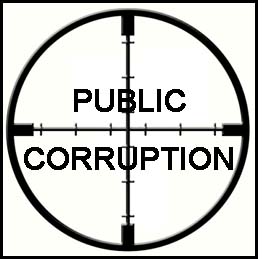 An October 22, 2012, Atlanta Journal Constitution article headlined Atlanta region sees spike in public corruption cases concluded that the Atlanta area has not seen an increase in public corruption. Rather, AJC writers Bill Rankin and David Wickert observed, Atlanta has seen an increased focus by federal authorities on investigating and prosecuting public corruption cases.
An October 22, 2012, Atlanta Journal Constitution article headlined Atlanta region sees spike in public corruption cases concluded that the Atlanta area has not seen an increase in public corruption. Rather, AJC writers Bill Rankin and David Wickert observed, Atlanta has seen an increased focus by federal authorities on investigating and prosecuting public corruption cases.
The AJC article was predicated on a State Integrity Investigation report, the result of the State Accountability Project undertaken in 2011 as a joint project by the Center for Public Integrity, Global Integrity, and Public Radio International. When the project ranked the states, Georgia ranked 50th, last among the states in public integrity. Idaho was 41st out of 50.
Idaho received a D-minus in its commitment to public integrity by public officials.
Readers should carefully note the topics of the questions and the questions asked by the (alleged) journalists who completed the survey. In general, the topics ask if each state’s ethics and integrity laws and procedures are adequate.
What the survey fails to address, however, is exactly the point raised by the AJC in its article. Legislatures can pass all the “ethics” laws and procedures they want, but if the laws have no teeth, no mandatory and independent enforcement mechanism, then they are superfluous window-dressing, nothing but feel-good legislation. That’s Idaho.
In Idaho, some county prosecuting attorneys have chosen to avert their eyes from public corruption cases that should be investigated for possible prosecution. There is little political risk for a prosecutor to go after the low-hanging fruit (drug dealers, child molesters, violent offenders, nighttime burglars, etc.). But to acknowledge the corruption of public officials and aggressively prosecute it carries considerable political risk. Many of the alleged offenders find it politically prudent to openly and aggressively support prosecutors and their families. Many of the offenders are considered to be upstanding members in the community. It’s much easier and certainly safer to prosecute those whom the public already despises than those whom the public admires.
Risk-avoidance is not unique to Kootenai County. As writer Caitlin Ginley noted in her article titled 50 states and no winners:
Many of the states at the bottom of the rankings, meanwhile, are sparsely-populated Western or Plains states like Idaho (40th), Wyoming (48th) and the Dakotas (North Dakota is number 43 and South Dakota comes in at 49). There, libertarianism roots, a small-town, neighborly approach to government and the honest belief that “everybody knows everybody” has overridden any perceived need for strong protections in law.
I believe at least in Idaho, her conclusion is off about one reticle click, however. What she calls a “neighborly approach” I call being too trusting and too unwilling to accept that the person with whom they played basketball or the person who has been in state government for over 20 years or the person who donates to all the worthy causes in the community is also the person who is manipulating public entities and rigging contract bids or elections. Calculated and intentional betrayal of trust is not a neighborly approach. Neither is believing that being a pillar of the community entitles one to steal from their neighbors.
Ginley’s article goes on to say
State officials make lofty promises when it comes to ethics in government. They tout the transparency of legislative processes, accessibility of records, and the openness of public meetings. But these efforts often fall short of providing any real transparency or legitimate hope of rooting out corruption.
Why? Because even in the states that do have laws, there is no meaningful enforcement. If there were, prosecutors and judges who must stand for election and re-election would be forced to prosecute and try the very people who are major financial contributors to their campaigns and families’ businesses. It’s much easier and politically safer to find reasons to dismiss or exonerate in the loophole-ridden state laws.
In public corruption just as in election fraud, the absence of prosecution does not indicate the absence of offenses. It only indicates an unwillingness by prosecutors and judges to recognize the problem and perform their duty
